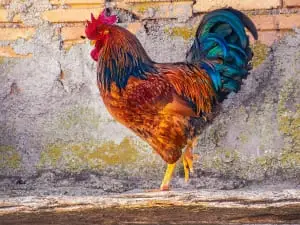
Roosters are known for their aggressive personalities as well as their crowing, which usually happens very early in the morning.
If you start to notice that your bird has stopped crowing, and has also stopped mating, you’d be right to be concerned. This article looks into why that may be happening
Table of Contents
Rooster stopped crowing and mating:
A change in your rooster’s behavior is cause for concern, especially if that behavior is a major part of the bird’s personality, like crowing and mating. Here are reasons why this may be happening:
The bird is injured:
Injuries can throw anyone off of their game, including roosters. If your bird was attacked by a predator, or was injured in some other way, then the bird may stop crowing and mating after that incident.
The bird may stop crowing and mating for quite a while, months even.
The bird may still be terrified or stressed by the incident, it may be worried that it will get attacked or injured again and stop crowing and mating as a result.
What to do:
The bird needs time to recover mentally and physically. You can help with this.
The attack likely bruised his ego. Give him positive reinforcement like telling him how much of a good and pretty boy he is, this will stroke his ego and will be good for him.
Show that you respect him by offering him food from your hand before you offer it to the other birds.
You may also want to put your bird in a separate enclosure to recover in peace. If you choose to do this, keep him in the sight of the other birds, or else the pecking order will be changed.
Electrolytes can also help with the stress that your bird is feeling after the incident. Offer electrolytes to your bird to get him to start feeling better. Do not offer electrolytes to your bird for more than 3 days
The bird is being bullied:
Bullying can happen to a variety of animals in the animal kingdom, it can happen to roosters as well.
If you bring a new rooster into the flock, and this new rooster starts to bully the existing roosters as a way of establishing dominance over them, then your weaker roosters may give in, becoming silent, and not mate with the hens anymore.
What to do:
Unfortunately, if your bird is being bullied because stronger birds are brought into the flock there is nothing you can do about it.
Birds establish and maintain a pecking order themselves and humans can’t do anything about it. Your rooster will have to earn respect on its own.
If the situation gets very bad you can get rid of the newly added roosters, the weaker roosters will gain their pecking order position back and everything will go back to as it was
The bird is sick:
Roosters are at their best when they are healthy but they can be at their worst when they are sick. Sickness can cause a rooster to stop crowing and even stop mating.
Crowing is not an easy task, this task requires a lot of energy from the bird. If a bird is sick then most of its power will go towards healing the illness.
A sick bird will not feel well and will avoid doing too many tasks, tasks like crowing or mating with hens will be avoided until the rooster is healthy again. Taking it easy helps with recovery.
On top of this, chickens and other roosters can tell when a bird is sick. The flock members may attack a flock member if they realize that it is sick.
Thus, the bird may keep away from the other flock members, by not mating with the hens, and it will keep from drawing attention to itself, by not crowing, until the bird is better
What to do:
Treating the ill rooster will help it recover faster and will get it back to acting normally. You’d need to figure out what is wrong with the bird and give it the medication it needs to get better.
Isolating the bird will also be helpful. This will allow the bird to recover in peace and keep the other flock members away from the bird as it recovers.
Old age:
Roosters can’t live forever, and they can’t grow and mate forever either. A rooster’s virility declines with age and so does their willingness to crow.
Older roosters stop crowing as a means of self-preservation, crowing draws attention to these birds and old crows who aren’t able to fight off younger fitter bullies will crow less.
What to do:
There is nothing you can do about a bird’s old age but you can try to make the last of your birds years more comfortable
If you enjoyed this article then you may also be interested in other chicken related articles. Here are some articles that you may be interested in: Chicken Shaking Head And Stretching Neck, Rooster Having Seizures, Crowless Rooster, Rooster With A Broken Neck, Chicken Seizure

